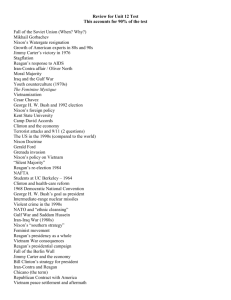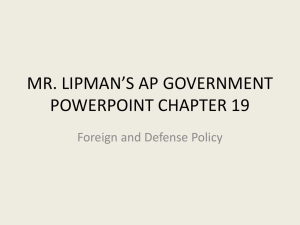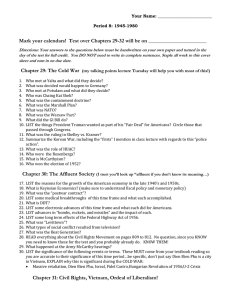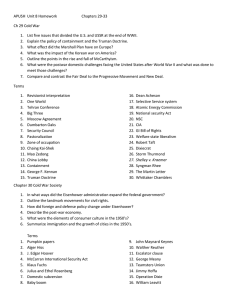Unit 9 Study Guide (ch. 36-40)
advertisement
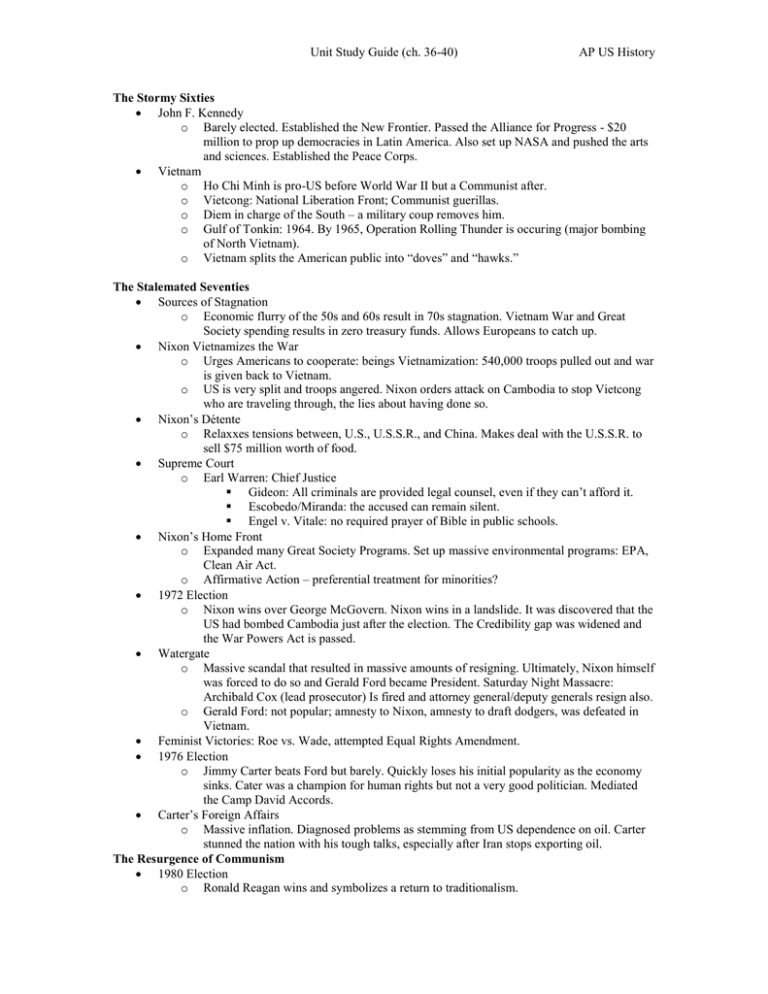
Unit Study Guide (ch. 36-40) AP US History The Stormy Sixties John F. Kennedy o Barely elected. Established the New Frontier. Passed the Alliance for Progress - $20 million to prop up democracies in Latin America. Also set up NASA and pushed the arts and sciences. Established the Peace Corps. Vietnam o Ho Chi Minh is pro-US before World War II but a Communist after. o Vietcong: National Liberation Front; Communist guerillas. o Diem in charge of the South – a military coup removes him. o Gulf of Tonkin: 1964. By 1965, Operation Rolling Thunder is occuring (major bombing of North Vietnam). o Vietnam splits the American public into “doves” and “hawks.” The Stalemated Seventies Sources of Stagnation o Economic flurry of the 50s and 60s result in 70s stagnation. Vietnam War and Great Society spending results in zero treasury funds. Allows Europeans to catch up. Nixon Vietnamizes the War o Urges Americans to cooperate: beings Vietnamization: 540,000 troops pulled out and war is given back to Vietnam. o US is very split and troops angered. Nixon orders attack on Cambodia to stop Vietcong who are traveling through, the lies about having done so. Nixon’s Détente o Relaxxes tensions between, U.S., U.S.S.R., and China. Makes deal with the U.S.S.R. to sell $75 million worth of food. Supreme Court o Earl Warren: Chief Justice Gideon: All criminals are provided legal counsel, even if they can’t afford it. Escobedo/Miranda: the accused can remain silent. Engel v. Vitale: no required prayer of Bible in public schools. Nixon’s Home Front o Expanded many Great Society Programs. Set up massive environmental programs: EPA, Clean Air Act. o Affirmative Action – preferential treatment for minorities? 1972 Election o Nixon wins over George McGovern. Nixon wins in a landslide. It was discovered that the US had bombed Cambodia just after the election. The Credibility gap was widened and the War Powers Act is passed. Watergate o Massive scandal that resulted in massive amounts of resigning. Ultimately, Nixon himself was forced to do so and Gerald Ford became President. Saturday Night Massacre: Archibald Cox (lead prosecutor) Is fired and attorney general/deputy generals resign also. o Gerald Ford: not popular; amnesty to Nixon, amnesty to draft dodgers, was defeated in Vietnam. Feminist Victories: Roe vs. Wade, attempted Equal Rights Amendment. 1976 Election o Jimmy Carter beats Ford but barely. Quickly loses his initial popularity as the economy sinks. Cater was a champion for human rights but not a very good politician. Mediated the Camp David Accords. Carter’s Foreign Affairs o Massive inflation. Diagnosed problems as stemming from US dependence on oil. Carter stunned the nation with his tough talks, especially after Iran stops exporting oil. The Resurgence of Communism 1980 Election o Ronald Reagan wins and symbolizes a return to traditionalism. Unit Study Guide (ch. 36-40) AP US History Reagan’s Economic Policies o By the 1980s, public is sick of New Deal/Great Society costs. Initiates massive budget cuts $35 billion. Vast majority of cuts fell on social programs, not on defense spending. “Reaganomics” is the policy of the era. In the early 80s, nation falls into a recession. Income gap between the rich and the poor widens. Renewing the Cold War o Reagan renewed the Cold War – SDI (Strategic Defense Initiative) was proposed but never built. o Reagan broke all arms-control regulations in 1983. o Reagan fought Communist rebels abroad Nicaragua, Lebanon, Grenada. The Lowering of the Cold War o Mikhail Gorbachev rises in Soviet Union – glasnost aims to introduce free speech and political liberty. o All INF’s (nuclear missiles) are banned from Europe. Iran Contra Issue o America agrees to sel arms to Iran in return for American hostages. This money is used to aid Nicaraguan “contra” rebels. Violate ban on helping the contras as well as Reagan’s vow not to negotiate with terrorists. Economics o Reagan actually accumulated a $2 trillion debt – more than all his predecessors combined. o Radical conservative movements emerged in the 80s to combat the liberalism of the 60s. George H. Bush o Won the 1988 election. Berlin Wall comes down and the Soviet Union officially falls. First Persian Gulf War. Americans with Disabilities Act. Chapter 36 Vocabulary Inchon: decisive UN victory in the Korean War. Taft Hartley Act: outlawed “closed” shops, made unions liable for damages they cause, and required union leaders to take non-Communist oaths. GI Bill of Rights: Allowed all servicemen to have free education when they return home. Sunbelt: 15 state region in the South that drastically increased in population. Levittown: Levitt brothers suburban project – built and sold many homes that looked almost identical. “Little Boxes.” Baby Boom: Soldiers return from war and marry their sweethearts baby boom. Cold War: Political “stare-down” between USSR and US. Nuremberg War Crimes Trials: Charged 22 people who were vital in perpetuating the Holocaust. Berlin Airlift: After USSR blockades Berlin, hoping to starve out the Allied powers, the organie and airlift to bring in food for Berlin. George Kennan/Containment: Firm containment of Soviet expansion would halt Communist power. Unit Study Guide (ch. 36-40) AP US History Truman Doctrine: containment policy; put $400 million toward helping Greece and Turkey from falling to Communism. Marshall Plan: Secretary of State John Marshall, with Truman, pass plan to send $12.5 billion to aid in European recovery in order to prevent spread of Communism. NATO: North Atlantic Treaty Organization – 13 nation pact stating that attack on one is attack on all. USSR responds with Warsaw Act. House Un-American Activities: Creates an Un-American Activities to battle Communism. Investigated “subversion.” Fair Deal: Truman’s running promise during the 1948 election – improved housing, higher minimum wage, full employment, better farm prices, Social Security expansion. NSC-68: National Security Council Memorandum Number 68 called for government military spending to be quadrupled in anticipation of the Korean War. Korean War: Democratic South vs. Communist North. US springs into action to help the South 38th parallel border is drawn. Benjamin Spock: Wrote a book on Baby and Child Care. Was immensely popular. Joseph Stalin: Leader of USSR in post WWII era. Took over Poland after agreeing not to. George Marshall: Came up with Marshall Plan. Truman’s Secretary of State. Rosenbergs: Tried and executed for selling nuclear secrets to the Russians. Alger Hiss: Tried under the Committee on Un-American Activities by Richard Nixon. Brinkmanship: pushing dangerous events to the bring of disaster in order to achieve most advantageous outcome. Domino Theory: If one place falls to Communism, those around it will do so as well. Chapter 37 Vocabulary Khrushchev: U-2 incident; US tries to fly a U-2 spy plane over the USSR but it is shot down – tightened tensions that had been falling. Planned obsolescence: Purposefully designed a product with a limited useful life so that it will break and people will have to but a new one. Organization Man: William H. Whyte, Jr. Fought against the new consumerism of the 1950s. McCarthyism: Major anti-communist sentiments started by Joseph McCarthy. Jonas Salk: Developed the first inactive polio vaccine. Elvis: Major singer of 1950s-1970s. Sexually more open and liberal. Economics of the 1950s: Explosion of the electronics field. Massive consumer culture “White collar” outnumber “blue color” for the first time. Unit Study Guide (ch. 36-40) AP US History Federal Highway Act of 1956: Built 42,000 miles of interstate freeways – connecting the U.S. Eisenhower: Won the 1952 election easily with Nixon as his VP. Fought to end the Korean War and did so. Election was the first with TV as a major medium. John Foster Dulles: Secretary of State under Eisenhower; “roll=back” theory containment isn’t enough, must push back and liberate the people under Communism. Mutually Assured Destruction: No one will fire off a nuclear bomb at another because they will get just as many sent back at them. Suez Crisis: Britain, France, Israel attack Egypt thinking that the US will supply them with oil. The US does not, and Britain, France, and Israel are forced to pull back. Ganal Abdel Nassar: Leader of Egypt during the Suez Crisis. Nikita Khrushchev: Eisenhower tried to thaw the Cold War with him, but Khrushchev rejected it (Geneva Conference). OPEC: Organization of Petroleum Exporting Countries: Saudi Arabia, Kuwait, Iraq, Iran, and Venezuela. Battle of Dien Bien Phu: First major confrontation of French Union and Vietnamese Communist groups. Checkers Speech: Delivered by Richard Nixon (Eisenhower’s VP) after being caught in a scandal. Touching speech – he is forgiven and stays on as VP. Civil Rights Movement: MLK’s Philosophy: non-violence, use of sit-ins and other non-violent means to inducing change. Rosa Parks: Civil rights activist – refused to give up her seat on the bus for the white person. SCLC: African American Civil Rights organization. Southern Christian Leadership Conference. MLK’s Letter from Birmingham Jail: MLK is arrested – religious leaders send him letters saying to stop but he responds by saying that he will not stop. SNCC: Southern Non-violent Coordinating Committee; gave focus and force to the Civil Rights Movement. March of Washington: “I have a dream speech.” – Black march on D.C. and MLK’s speech. Chapter 38 Vocabulary Kennedy’s First Inaugural: Very stirring: “Ask not what your country can do for you, but what you can do for your country.” New Frontier Legislation: Kennedy’s social program. Berlin Wall: Wall the separated East (Communist) and West Germany. Bay of Pigs Incident: U.S. aided invasion of Cuba by rebels. Total disaster, the revolt failed. Castro pushed more toward Communist Camp. Cuban Missile Crisis: USSR sends nukes to Cuba, they point them at us, we say to get rid of them: 13 day stand off. Unit Study Guide (ch. 36-40) AP US History Peaceful Coexistence: Communism and Capitalism can “peacefully coexist.” Ideology adopted by sovietinfluenced “communist states.” Freedom Riders: Chartered buses to tour South and end segregation. Drew more attention to segregation in the South. Kennedy Assassination 11/22/62: JFK is killed while touring Dallas, TX. Warren Commission: Established to find out who killed Kennedy. Conclusion Lee Harvey Oswald. 23rd Amendment: Gives residents of D.C. the right to vote for representatives in the electoral college. 24th Amendment: Eliminated poll taxes. 25th Amendment: Officially established order of succession should a president die in office. LBJ’s War On Poverty/Great Social Agenda: Larges reform agenda since the New Deal. Money to students, establishment of Medicare and Medicaid, Immigration/Nationality Act of 1965, Head Start. Civil Rights Act of 1964: Banned all racial discrimination in private facilities open to the public. LBJ’s Big Four Reforms: Aid to education, medical care for elderly/poor, immigration reform, new voting rights bill. Black Power Leaders: Malcolm X; fought to achieve Civil Rights through violent means. Vietnam “Quagmire”: Communist Ho Chi Minh is threatening a communist revolution JFK sends more troops and they die often. Protests to get us out are massive. Election of 1968: Nixon wins the election after LBJ announces that he will not run again. 26th Amendment: 18 is the voting age. Gulf of Tonkin Resolution: Essentially gave LBJ a blank check to fight in Vietnam. Chapter 39 Vocabulary Draft Deferments: Exemption for college students from being drafted. Put the weight of Vietnam on the poor. Treatment of Soldiers: Soldiers are treated terribly in and out of combat. Brutal fighting conditions, they are hated back home. Vietnamization: Nixon’s plan to give the war back to Vietnam. Pulls out a large chunk of US troops. Henry Kissinger: Sent to China to encourage better relations – success. Nixon’s national security advisor. My Lai Massacre: U.S. soldiers slaughter women and children in the village My Lai. Shows U.S. troops’ frustration with the war. Pentagon Papers: Documents about the Vietnam War leaked by Danial Ellsberg. They exposed the deceit used by Kennedy and LBJ’s administration. Created the “credibility gap.” Unit Study Guide (ch. 36-40) AP US History War Powers Act: stated that the president must report use of US troops to Congress within 48 hours as well as set a 60 day limit on those activities. Silent Majority: Americans who supported the war but did so quietly. Christmas Bombings: Massive air raids on North Vietnam ordered by Nixon. Ordered after the war was supposed to be dwindling down. Détente: relaxed tensions. Occurred with USSR. Nixon’s visit to the USSR & China: used to establish détente between nations. Rachael Carson: Wrote Silent Spring, a piece that exposed the disastrous effects of pesticides (DDT). Roe vs. Wade: controversial Supreme Court case legalizing abortion (Warren Burger is Chief Justice). SALT II: Carter’s attempt to ease tensions with the USSR. Not ratified. Smoking Gun Tapes: The “last tape” that proved Nixon’s had prior knowledge of Watergate. Resulted in his resignation. Earl Warren: Chief Justice of Supreme Court. Very liberal and make several landmark decisions. Stagnation: persistent high inflation coupled with high unemployment and stagnant demand in a country’s economy. Gerald Ford: After Nixon’s first VP resigned, Nixon called for Ford to be the new VP. Since Nixon had to resign, Ford became President. Jimmy Carter: Won the 1976 election over Gerald Ford. Camp David Accords: Mediated by Carter. Israel will withdraw from territory gained the the 1967 war, and Egypt will respect Israel’s territories in return. Leonid Brezhnev: Soviet Premier who formed SALT II with Carter. Iran Hostage Situation: militants take hostage US embassy in Tehran. Dragged on for most of Carter’s term. Chapter 40 Election of 1980: Edward Kennedy vs. Ronald Reagan. Reagan won in a landslide signaling shift back to traditionalism. “Reaganomics”: policies favorable to businesses. Lower individual taxes, almost eliminating federal estate taxes, created tax-free saving plans for small investors. Glasnost and Gorbachev: Soviet’s plan to Westernize. Glasnost: “openness. Shifting toward free-speech and press as well as toward a free-market economy. The Iran-Contra Affair: Reagan agrees to sell arms to Iran in return for hostages. This money is funneled into helping the Contra-rebels in Nicaragua, something that was strictly prohibited. Conservative appointments to the Supreme Court: Reagan appoints many conservative judges. Antiabortion and anti-affirmative action. Unit Study Guide (ch. 36-40) AP US History Election of 1988: George H Bush wins the election. Bush-Gorbachev Summits: Summits to negotiate and declare an end to the Cold War. First Persian Gulf War: Iraq invades Kuwait, US invades Iraq to liberate Kuwait. Also known as Operation Desert Storm. Battle against Sadam Hussein. End of the Cold War/Collapse of the Soviet Union: Soviet Union is disintegrated into the Commonwealth of Independent States. Americans with Disabilities Act: Landmark law (George H.) that banned discrimination against citizens with disabilities. 27th Amendment: Stated that Congressional pay raises would not go into effect until after another Congressional election had taken place.
